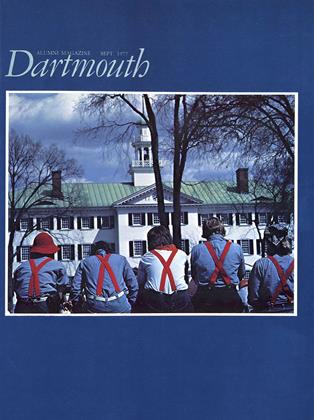The authors are associate professors of psychiatry, or perhaps we should say alienists, at Dartmouth Medical School. The Cold Fire ranges freely from contemporary popular song to anthropology, from Abbie Hoffman to Ralph Ellison, in its discussion of the individual alienated from his culture. Alienation, however, is made to seem more a psychological and, to a lesser degree, social phenomenon than a form of literary heroism. James Dean isn't mentioned in the index.
The book is impressionistic at times - a long essay, really, despite its citations and footnotes. As a result, it is hard to pinpoint the authors' conclusions. But the questions they raise almost compel a process they applaud: making use of "moments of silence." And if the impact of the book is diffuse, there are many unexpected pleasures. Most notable among these is what amounts to nothing less than a wry and lucid one-page guide to Freud's place in intellectual history.
The Cold Fire is of greatest value in providing a perspective on some of the paradoxes of modern American society: the increasing isolation of the ever-more-crowded individual, the "escape from gratification," the fact that "sanity, as defined by our culture, is seen as no more than a special case of madness." A native and resident of New York City like me is well advised to pay attention to these matters. And all of us can profit from pondering the relevance of Freud's Rat Man or of gruesome tribal myths and initiation rites. The book stimulates what it celebrates: the anguish and exhilaration of introspection.
THE COLD FIRE:ALIENATION AND THEMYTH OF CULTUREBy Stanley D. Rosenberg andBernard J. BergenUniversity Press of New England, 1976214 pp. $10
Kenneth Paul is an assistant national editor forthe Long Island newspaper Newsday.
 View Full Issue
View Full Issue
More From This Issue
-
 Feature
FeatureScience and Technology Under Siege
September | October 1977 By Thomas Laaspere -
 Feature
FeatureThirty-Eight Days Alone
September | October 1977 By Ned Roesler -
 Feature
FeatureDartmouth Passages
September | October 1977 By Marshall Ledger -
 Feature
FeatureWorlds Together
September | October 1977 -
 Article
ArticleFanciers
September | October 1977 By BRAD HILLS '65 -
 Class Notes
Class Notes1927
September | October 1977 By ERWIN B. PADDOCK
KENNETH PAUL '69
-
 Letters to the Editor
Letters to the EditorLetters to the Editor
OCTOBER 1969 -
 Letters to the Editor
Letters to the EditorLetters to the Editor
JANUARY 1972 -
 Books
BooksPATTERNS IN THACKERAY'S FICTION.
APRIL 1970 By KENNETH PAUL '69 -
 Books
BooksWEIRD AND TRAGIC SHORES: THE STORY OF CHARLES FRANCIS HALL, EXPLORER.
JUNE 1971 By KENNETH PAUL '69 -
 Books
BooksTHE STICKS: A PROFILE OF ESSEX COUNTY, NEW YORK.
JANUARY 1973 By KENNETH PAUL '69 -
 Books
BooksTHE MYTH OF THE MIDDLE CLASS NOTES ON AFFLUENCE AND EQUALITY
APRIL 1973 By KENNETH PAUL '69
Books
-
 Books
BooksALUMNI PUBLICATIONS
May, 1922 -
 Books
BooksTHE SNEETCHES AND OTHER STORIES.
May 1962 -
 Books
BooksTHE LEDYARD CANOE CLUB OF DARTMOUTH, A HISTORY
DECEMBER 1967 By CHARLES E. BREED '51 -
 Books
BooksCurse of Occupation
March 1980 By David Wykes -
 Books
BooksALUMNI PUBLICATIONS
February 1920 By F.P.E., C.E.B. -
 Books
BooksSCIENTISTS IN ORGANIZATIONS: PRODUCTIVE CLIMATES FOR RESEARCH AND DEVELOPMENT.
JANUARY 1968 By JOHN T. LANZETTA

